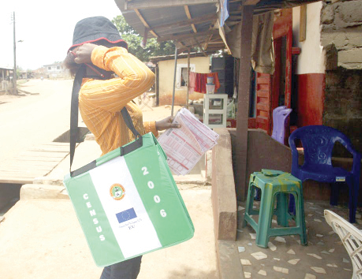Misinformation is a wrong message sent without intention to deceive the public, ADETOLA BADEMOSI writes on how the National Population Commission (NPC) is combating the menace amidst cultural beliefs ahead of the 2023 Population and Housing Census.
In less than a month, Nigeria will be conducting its first ever digital population and housing census. Conducting a successful and credible census in May, 2023 will no doubt be a major milestone considering the controversies that had trailed previous exercises.

The National Population Commission (NPC) has, on its part, conducted various exercises which includes Enumeration Areas Demarcation of the 774 Local Governments Areas (LGAs), trainings and publicity as part of its pre-census exercise.
However, the Commission has had to deal with misinformation, disinformation regarding the yet-to-be conducted exercise.
Already, the conduct of Census in Nigeria is one that comes with several challenges ranging from religious and ethnic beliefs, result falsification, high level of illiteracy among others.
Stakeholders have also, on several occasions, expressed worries over the effect of religious and cultural beliefs on the census, a menace the NPC has made efforts to tackle head on.
Use of misinformation to discredit census
Recently, a viral audio tape on the WhatsApp social media platform suggested that the religious affiliations of respondents will be canvassed in the 2023 Population and Housing Census.
The audio tape had called on Muslims in Nigeria to see the purported canvassing of information on their religious affiliations as a tool to suppress their population figures.
It therefore instructed adherents of the Islamic faith to resist any attempt to divide the religion of Islam by refusing to answer any question on their religious affiliations.
But the Commission Director, Public Affairs, Isiaka Yahaya, had issued a counter statement stressing that the 2023 census will not canvass questions on religious affiliation.
He had explained that the decision to exclude religion along with ethnicity from the census questionnaire was taken in consideration of the sensitive nature of these issues within the Nigerian polity and the need to save the census data from needless controversies and attention.
According to him, a fact check on the origin of the purported message showed that it was first circulated in Ghana during its 2021 population census exercise through a Whatsapp message.
He said: “This negative message found its way into the Nigerian social media space in July 2022 when the Commission conducted the Trial Census.
“The re-circulation of the message in audio form as the Commission sets to conduct the 2023 Population and Housing Census in May 2023 is an indication that some elements are bent on drawing the 2023 Census into unnecessary controversies through propagation of falsehood and incitement of a section of the population to destabilize existing peaceful coexistence in the country.”
Modifications to Census Questionnaire
The Commission explained that between 2016 and 2023, it consulted with data users and the public on continuing the topics from the 2006 Census with a number of adjustments and additions to the questions.
According to the Chairman, Hon. Nasir Isa Kwarra, the development of the 2023 Population and Housing Census questionnaire had allowed for data collected to be useful for planning with a careful consideration of the burden and time taken to fill the questionnaire by both the enumerator and the respondent.
He however pointed at the need for the Census data to be comparable and compatible with previous censuses and also with other data produced by other statistical agencies in Nigeria and the wider community.
Kwarra said:” The census uses the current 2006 classifications where applicable but reviewed them to reflect changes in the Nigerian society. Where there were no 2006 classifications, census-specific classifications have been developed and are reviewed prior to each test.”
“The questionnaire is robust and includes demographic characteristics of respondents and other socio-economic characteristics but without any question whatsoever on religion and ethnicity,” it added.
Recruitment of ad-hocs
For the census exercise, the Commission said it will engage over 885,000 persons for census with N77billion earmarked for their training on listing of all buildings and households in the country for seven days.
However, the Commission had recently expressed worries over how quickly the recruitment site was hacked and how rumours were peddled on corrupt recruitment processes.
Dr Eyitayo Oyetunji, Chairman, Publicity Committee, National Population Commission (NPC) at the opening ceremony of a one-day capacity building Workshop for members of the National Census Publicity Committee in preparation for the 2023 Population and Housing Census had sited instances of how the Commission was accused of replacing names of selected candidates with another.
He said the fake news were peddled to discredit efforts of the Commission at ensuring a credible recruitment process.
His words: “we have not even started sending messages, how can you now say that we are replacing the names of some selected candidates with another? So this is an issue.”
Misinformation and fake news are onslaughts that stakeholders in the media have strived to fight. It, however, the NPC needs to continue to be on its toes to ensure it does not mar the conduct and outcome of the much anticipated census exercise.







